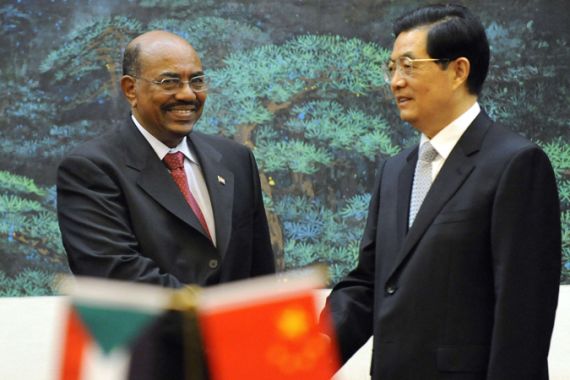China bolsters economic ties with Sudan
Red-carpet welcome for Sudanese president in Beijing as countries consolidate close relationship with oil agreement.

 |
| Al-Bashir, right, was greeted by the Chinese president and given an honour guard reception [AFP] |
The presidents of China and Sudan have cemented economic ties between their countries during a state visit by Omar al-Bashir, the Sudanese leader, to Beijing.
Bashir was greeted by Chinese President Hu Jintao at the Great Hall of the People and given an honour guard reception on Wednesday, a day after his delayed arrival in the Chinese capital.
Hu said he was very happy to host Bashir, an internationally wanted war crimes suspect, whose country is a crucial oil supplier to China.
“I believe that this visit will definitely have great significance for the consolidation and development of traditionally friendly relations between China and Sudan,” Hu said.
“I am willing to have thorough exchanges with you on our developing relations and other shared issues.”
Bashir thanked his hosts for his “warm welcome and treatment.”
Their talks are expected to focus on challenges in the African nation ahead of South Sudan’s independence from Khartoum on July 9.
China is a major buyer of Sudanese crude oil, and is keen to ensure the partition of Sudan into two states will not descend into fighting that could disrupt supplies and damage Beijing’s stake on both sides of the new border.
| In video |
|
Al Jazeera’s correspondent in China, Melissa Chan, reports on the Sudanese president’s visit. |
On Tuesday, officials for China’s national oil company signed a deal with Sudanese government officials to deepen oil and gas cooperation, China National Petroleum Corp said.
Bashir has been indicted by the International Criminal Court (ICC) for alleged genocide, war crimes and crimes against humanity that occurred in Sudan’s western Darfur region, where about 300,000 people have died since 2003.
Al Jazeera’s Melissa Chan said that the Sudanese president’s visit to China highlighted the mutual importance of the countries’ relationship and Beijing’s concern that the north-south split shouldn’t affect the flow of oil eastwards.
“The oil is produced in Sudan, mostly in the south but it will need to be transferred through the north in order to make its way to China.
“The Chinese need to manage the relationship between the north and south Sudan; that is why they have invited Bashir,” she said.
The Sudanese leader’s visit to China has sparked outrage among rights groups, and earned the reproach of the US State Department.
“We continue to oppose invitations, facilitation, support for travel by ICC indictees,” State Department spokeswoman Victoria Nuland said Monday.
“We have a longstanding policy of strongly urging other nations to do the same,” she said. “We have urged China to join the international community in its call for Sudan to cooperate fully with the ICC.”
ICC statutes dictate that any member country should arrest Bashir if he visits. China is not a party to those statutes, nor is the United States.
Amnesty International said earlier this month that China risked becoming a “safehaven for alleged perpetrators of genocide” if it hosted Bashir.
The United Nations Security Council voted unanimously on Monday to send a 4,200-strong Ethiopian peacekeeping force to Abyei in a bid to douse tensions.
An estimated two million people died in Sudan’s two-decade civil war.
A 2005 peace accord, the Comprehensive Peace Agreement, ended the conflict and allowed for a referendum in January in which the south voted by an overwhelming majority to split from the north.